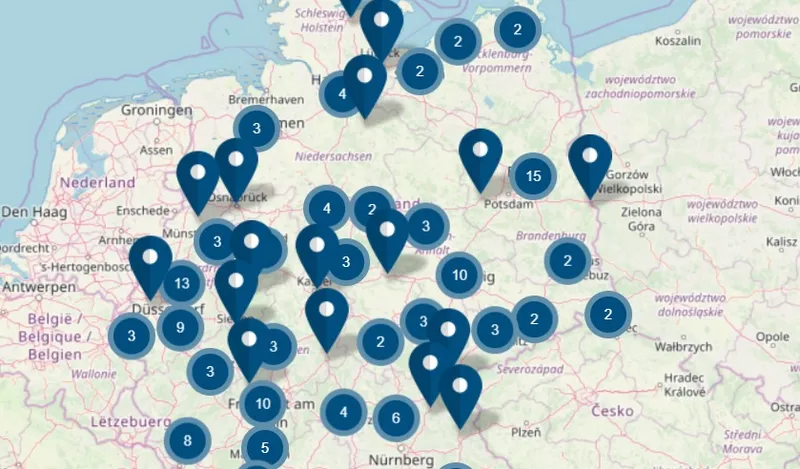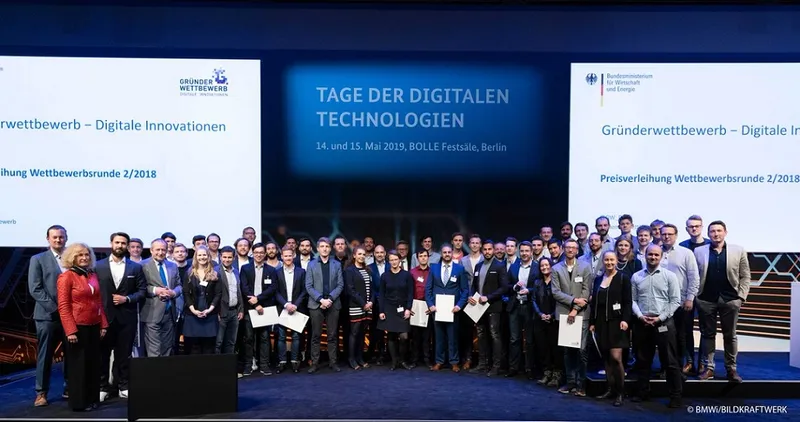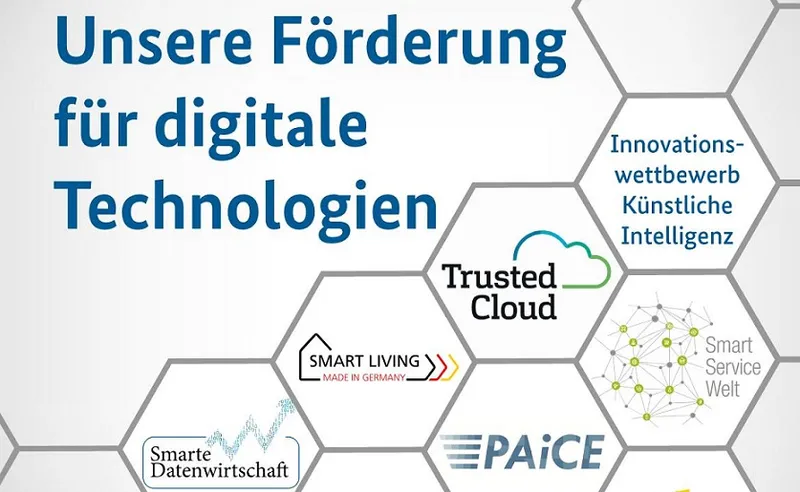How this government funding programme has launched over 2,300 startups
Germany’s EXIST programme funds startups in fields ranging from bio-technology and energy to automation and environmental solutions. The startups are located in over 190 universities across the country. Here’s how the programme works.
[This article is part of Startup Hatch, the YourStory series on incubators, accelerators, makerspaces and co-working spaces in the startup ecosystem. See earlier profiles of initiatives at IIT Bombay, IIM Bangalore, BITS Pilani, NCL, Tata Elxsi, Axilor, NID, IIIT-Bangalore, IIIT-Hyderabad, Vellore Institute of Technology, PSG Coimbatore, Workbench Projects, Makers Asylum, NetApp Excellerator, Pitney Bowes Accelerator, TechStars, Indigram Labs, WeWork, Z Nation Lab, Sandbox Startups, Brigade REAP, Target India Accelerator, Zone Startups, Maersk, Anthill Studio, UnternehmerTUM, AZO, and Ashoka Innovators.]

Germany’s Federal Ministry for Economic Affairs and Energy (BMWi) runs an extensive programme to promote startups, called EXIST. It offers grants to transfer university research into campus startups, and helps foster a culture of entrepreneurship through innovation workshops, consulting services, and industry connects. The phases of the entrepreneurial journey are evocatively described as Get Started, Get Prepared, Get Together, and Get Traction.
Oliver Hunke is in charge of the EXIST programme, and has been with BMWi since 2001. He has also served as a lecturer in organisational management and a consultant in trade and export finance. He graduated from the University of Konstanz in Baden-Württemberg and University of Manchester (UK).
Oliver joins us for an interview on the founding vision of EXIST, support services for creating a culture of entrepreneurship, selection criteria of startups, and future plans.
The meeting with EXIST was made possible upon an invitation by the German government. The Indian delegation included representatives from Karnataka Startup Cell, NASSCOM, Axilor, and YourStory.
Edited excerpts of the interview:
YourStory: What was the founding vision of EXIST, and how is it supported?
Oliver Hunke: Young, innovative businesses form an important cornerstone for Germany's economic competitiveness. This is particularly true of businesses emerging from settings such as universities and research institutes, which are developing innovative products from new ideas and research findings.
The cutting-edge research taking place at German universities and research institutes offer an ideal breeding ground for innovative ideas. The businesses founded by these institutions are strategically positioned to gain a foothold in international markets early on. Together with their technological advantage, this enables them to grow faster than other enterprises. This is a good foundation for high-quality jobs.
The Federal Ministry for Economic Affairs and Energy (BMWi) supports startups from universities and other research institutes with its “EXIST - University-based Startup” programme. The goal is to achieve a more consistent transfer of the findings from scientific research into the economic value chain, thereby increasing the number of innovative startups.
To this end, the BMWi focuses on three modules: anchoring a culture of entrepreneurial independence at universities and research institutes; promoting innovative startups from universities and research institutes with the EXIST Business Startup Grant; and supporting outstanding research-based startups from science with the EXIST Research Transfer programme.
This programme aims at improving the entrepreneurial environment at universities and research institutes. It also aims at increasing the number and success of technology and knowledge-based business startups. The BMWi supports university graduates, scientists and students to this end in preparing their technology and knowledge-based startups. EXIST also promotes a lively and lasting entrepreneurial culture at public and private universities.
YS: How many startups have graduated from your programme, and which startups are currently enrolled?
OH: Around 2,300 startups from a wide variety of research fields have graduated from our programme. We have established an Alumni Web Platform; see the full list and categories here. The startups are in various fields like bio-technology, energy, optical technologies, digital media, automation, medical technology, lasers, and environmental technology. Lists and links to startups in grant stage or transfer of research (Phase 1, Phase 2) are accessible online.
Graduated startups include 4GENE, A+ Composites, Additive Works, Ambiverse Software, BitFlux, Celago Sensors, Code Intelligence, Cold PlasmaTech, DSP Mobile, FiberBridge Photonics, GeneTalk, Memetis, Munich Composites, PhotonScore, Systasy BioScience, Turbonik, and many more. One of our startups has also achieved unicorn status: Celonis, which helps companies turn process insights into action.

YS: What would you define as success for EXIST?
OH: Success would come from a thriving culture of entrepreneurship and transfer of innovation being instilled at German universities. People from all over the world will be able to transfer their innovative ideas into products, launch companies with successful business models, and employ people in Germany.
EXIST will also be successful if more investors place their funds in German startup companies. For individual startups, success would be if they form a legal entity, raise investment rounds, and gain access to local and international markets.
YS: How is the EXIST programme managed?
OH: The programme is run by Project Management Jülich, a project management agency founded in 1974. It has expertise in research and innovation management, and supports the objectives of the Federal Ministry for Economic Affairs and Energy (BMWi).
The team responsible for the EXIST programme combines experiences in entrepreneurship, science and technology transfer. We also collaborate with a Germany-wide network of more than 190 universities and their transfer services who consult for the applying teams.
YS: What would you say are the top strengths Germany offers startups?
OH: Germany is the entry gate for many international companies to the European market. We have a talent pool of highly educated employees. There is also a rising culture of entrepreneurship at German universities, and plenty of government funding programmes for innovative startups.
YS: What are the key challenges faced by startups, and how can you help to bridge the gap?
OH: Startups with innovative ideas often face the following challenges: risk-avoiding culture, lack of potential investors, and lack of culture to accept and recover from failures. For social entrepreneurs, the biggest challenge in social innovation is to create and keep on adapting a sustainable business model.
The EXIST programme gives entrepreneurs freedom to start a company with almost no financial risk. The country-wide entrepreneurial and transfer network also gives young entrepreneurs free professional consulting and mentoring.
From many entrepreneurs, we get feedback that EXIST also became a quality label for investors and corporation partners. The EXIST programme bridges the gap between getting a product into the market and finding a possible investor.

YS: What are the selection criteria for startups in EXIST? How does the admission process work?
OH: There are three key requirements, as well as eligibility criteria.
1) Level of Innovation
The innovation should have a significant higher customer benefit than the status quo. The innovation should be research-based. There should be a significant USP, and value for society.
2) Team
3) Market
The startup should have a reasonable market entry strategy and finance plan. The market size should allow a profitable business to exist and thrive.
There are also other aspects we look at in the startups. They should not yet be incorporated; we only fund teams that are not incorporated at the beginning of the funding period. After the funding period has started, the entrepreneurs can incorporate.
Our target group includes scientists from public, non-profit research institutes and universities. University graduates and former academic staff members (up to five years after getting a degree or dropping out) can apply.
Also read: How this spacetech competition hub and accelerator spurs the next frontier of entrepreneurship
Students should have completed at least half of their studies at the time of applying. Entrepreneur teams can be made up of two to three people. Teams that are made up of a majority of students are only funded in exceptional cases.
One of the three team members may have a qualifying professional education and can be funded as the technical staff. Or, one of the team members may have a degree that is more than five years old.
We look for cases where the idea and innovation comes from scientists and future entrepreneurs who want to transfer their research to a scalable, profitable product and business model. These innovators get into contact with the University Transfer Institute which verifies if that idea has the potential to receive the EXIST Grant.
The actual applicants are German universities or research institutes that are part of the entrepreneurial network and can apply for the grant. They forward the grant to the entrepreneurs as a form of scholarship or salary. The full list of our extensive partner network can be viewed here.
YS: What support and services do startups receive in EXIST?
OH: The EXIST Business Startup Grant includes funding for 12 months and three team members, for up to 3,000 euros per month per person. There is also extra support for parents, of 150 euros per month per child. We also cover material expenses and startup-related coaching, of up to 35,000 euros. The maximum period of funding is one year.
Infrastructure during the pre-startup phase, as well as technical and startup-related assistance, is provided by the research institution. This includes mentorship and incubator support.
EXIST Transfer of Research is open for all high-technology startup projects with intensive development periods. There are two funding phases of support. Phase I, for 18-36 months, covers technical feasibility and product development. It covers three scientists or technicians, and one graduate from business school. They are eligible for up to 250,000 euros in material expenses for equipment, capital goods, property rights, coaching, and so on.
Phase II is after formation of the company, and covers product development onward to market entrance. Startups in this phase are eligible for 180,000 euros for 18-24 months. This phase of funding deals with measures to start business operations in the newly created technology venture as well as meeting the prerequisites for external business financing.

YS: What percentage of equity or royalty do you take in your startups?
OH: The EXIST programme is a non-refundable grant; it doesn't take any equity or royalty. It gives entrepreneurs freedom to start a company with almost no financial risk.
YS: What kinds of IP are being created by your startups?
OH: The EXIST programme is open to innovative ideas of all sectors so we have a broad bandwidth of IP being created.
YS: How does EXIST interact with other entities in the startup ecosystem?
OH: EXIST is a funding programme, not an incubator. EXIST is also a platform to many players in the market that support the success of our scholars. EXIST teams can additionally join an incubator programme if it is not funding their monthly income. Compared to most incubator programmes, EXIST is open to all industries and is not specialised in one particular research or business field.
YS: What are your plans for the coming three-five years with respect to new startups?
OH: We plan to enable more universities to become hotspots of knowledge transfer to innovative products and startups. We will be fostering more regional networks where universities, companies, startups, and other partners collaborate.
We will also foster the international endeavour of German universities and research institutes to attract international entrepreneurs. Finally, we will be funding more innovative startup ideas.
YS: What are your recommendations or words of inspiration to the startups and entrepreneurs in our audience?
OH: Here are some inspiring quotes from Ludwig Erhard, German Chancellor (1963-66), and Minister for Economy (1949-63); he is regarded as a mastermind of Germany’s post-war economic miracle.
I have experienced in my life that one can easily fail with little things, but big plans are filled with that fascination that also touches people and that already makes up part of their success.
A compromise is the art of dividing a cake in such a way that everyone believes he has the biggest piece.
Competition is the most promising means to achieve and secure prosperity.







